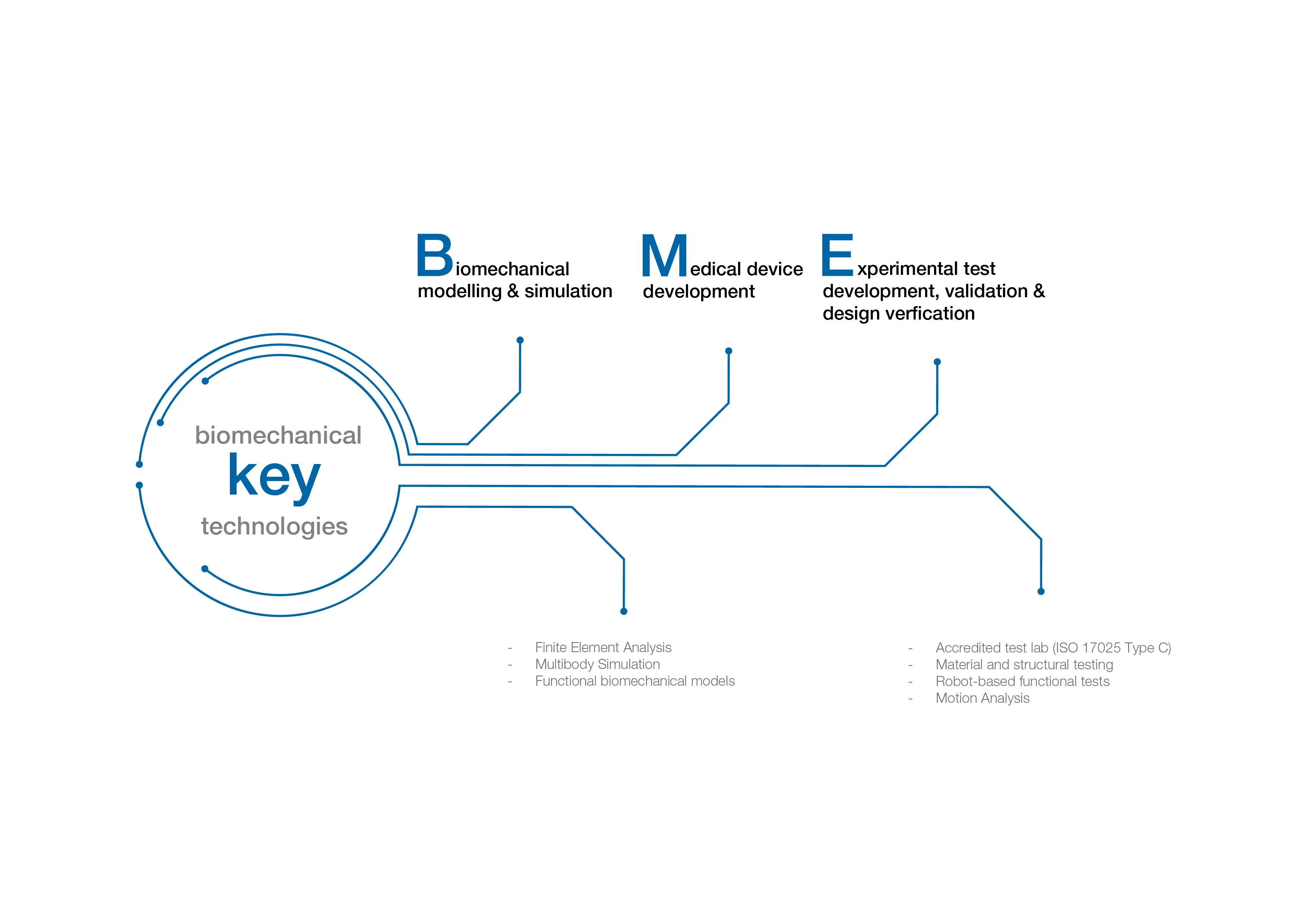Biomechanical Engineering
Welcome to the Technical Focus Biomechanical Engineering (BME)
Discover our research fields, methodological competences as well as our courses on the following pages.
The BME Group was founded more than 20 years ago and is one of the technical focus areas of the Institute for Mechanical Systems (IMES). Our interdisciplinary working group consists of engineers and natural scientists and we are specialists in the following business and research fields:
Business and research fields
The key to the successful implementation of research and industrial projects lies in our methodological expertise, in the development of medical devices, biomechanical computer models & simulations as well as functional testing methods (according to ISO17025 Type C) and their analyses, developed and established over several years. Service Catalogue (PDF 2.74 MB)
We are strongly committed to teaching and offer the specialisation Biomechanical Engineering I and II for Bachelor students of Mechanical Engineering and Systems Engineering as well as for Master students of MSE Medical Engineering.
Interested Bachelor and Master students are given the opportunity to carry out project work and Bachelor and Master theses in ongoing projects with industrial partners. Information on current projects can be found on the pages of the individual business and research fields.
Projects
-
Development of trunk therapy for the assessment and training of balance & control in neurorehabilitation (Holoreach)
The SNSF-funded Health & Wellbeing project deals with the topic of trunk stability. The aim is to create a novel, technology-supported training concept to promote selective trunk training. In a first step, this includes the implementation of tracking software for the kinematics of the test…
ongoing, 01/2024 - 02/2026
-
How well do you control your biosignals? (MuscleJump)
This demo project relates to the current application of EMG sensors (electromyography). Nowadays, EMG sensors can be used to control modern arm or leg prostheses, giving patients more freedom. However, controlling such prostheses is a challenge and requires lengthy training. Especially at the…
completed, 01/2024 - 07/2024
-
Mechanobiological plastic model
Plastics are experiencing increased interest in medical technology. Due to their mechanical properties, plastics correspond more closely to human tissue than metallic materials such as titanium or cobalt-chromium. The so-called mechanobiology of human soft tissue, especially cartilage and…
completed, 01/2022 - 12/2022
-
T-Chair II – Assistive therapy concept for trunk balance & stability after stroke
Trunk control is a key factor for a successful rehabilitation outcome early after stroke. Training must start early after stroke in sitting as trunk control is essential for standing and walking. A robot assisted medical chair enables therapies at various levels of trunk-control impairment. The need…
completed, 10/2017 - 06/2023
-
Development of a unicondylar knee joint prosthesis with physiological kinematics
This project has two objectives:1. to optimise the surface geometry of an existing unicondylar knee prosthesis in order to enable natural knee kinematic2. to model and validate a generally valid parameter model of the knee ligaments in FEA. In the development process, both experimental…
completed, 07/2019 - 12/2022
-
OsteoFusion: Highly osteoconductive and fast incorporating ceramic implant solutions for Sports Medicine (and Orthopedics)
In Sports Medicine, a faster return to full activity, a better cost-benefit ratio, and maximized patient comfort are paramount. OsteoFusion provides a solution with an innovative ceramic implant that transforms into bone being anchored by ultrasonic liquefaction of a fiber-reinforced biocomposite.
ongoing, 10/2023 - 03/2027
-
InnoTreat: Towards Personalized Treatment Decisions with Digital Twins
The "InnoTreat: Towards Personalized Treatment Decisions with Digital Twins", initiated by the Digitalization Initiative of the Universities of Zurich (DIZH), aims to personalize clinical diagnosis and treatment decisions for shoulder pathology. By integrating patient-specific anatomy into…
ongoing, 11/2024 - 04/2026
-
MyoPlus: Multisegmental, Functional Muscle Simulation in Physiologic Models (Myo+)
The project content deals with the Development and Testing of physiological muscle models and is executed in collaboration with the EELISA project partner of the University of Sant'Anna, Pisa.
ongoing, 01/2025 - 11/2025
-
Holoreach
Development of an Augmented Reality Training Programme for Stroke Patients
completed, 05/2020 - 05/2023
-
The mechanobiology of fibroblasts in soft nanofibrous materials – novel test protocols for in-situ mechanical testing
Background: Mechanobiology is the study of the influence of mechanical loads on the behavior of cells, especially on their differentiation, proliferation, morphology, or metabolic activity. It determines the interaction of implants with the body and ultimately, its integration by tissue growth and…
ongoing, 01/2025 - 11/2025
-
Influence of additional weight carrying on load-induced changes in glenohumeral translation in patients with rotator cuff tear - a…
This project aims to explore human shoulder biomechanics using a functional shoulder model. The experimental tests are compared with subject measurements for a better characterization of the muscle and joint forces acting on the shoulder.
completed, 09/2020 - 08/2023
-
TAMINA® – lmproving proximal humerus fracture treatment
completed, 01/2023 - 06/2024
-
Hip-Kick – playful training from the hip
The background of this demo object is the playful visualisation of novel, interactive forms of movement visualisation. Independently executed, game-oriented rehabilitation programmes of neuro-patients have recently revolutionised therapy. It has been shown that direct feedback for patients has…
completed, 01/2023 - 11/2023
-
Robot-based experimental in vitro studies to evaluate two surgical techniques for a meniscal lesion with respect to knee kinematics
In this project, the following hypotheses will be investigated with experimental robot-based in vitro tests on human leg specimens1) Ramp lesion of the posterior horn of the medial meniscus leads to increased anterior translation and rotational instability in a knee with an ACL rupture.2) In a knee…
completed, 01/2022 - 05/2023
New Publications
-
Röhrnbauer, Barbara; Betschart, Cornelia,
2025.
Novel interdisciplinary pathways in pelvic floor disorder diagnosis and treatment.
In:
30th Congress of the European Society of Biomechanics, Zurich, Switzerland, 6-9 July 2025.
-
Zimmerli, Joël; Hofmann, Jonas; Röhrnbauer, Barbara,
2024.
A continuum mechanics based quantification of microscale kinematics of nanofibrous membranes[poster].
In:
Annual Meeting of the Swiss Society for Biomedical Engineering SSBE Abstract Book.
Annual Meeting of the Swiss Society for Biomedical Engineering SSBE, Winterthur, Switzerland, 5 September 2024.
SSBE.
pp. 42.
Available from: https://doi.org/10.21256/zhaw-32725
-
Lone, Omar; Weiss, Manuel; Baumgartner, Daniel; Chavarriaga, Ricardo,
2024.
A Python-based open software for EEG-based brain-machine interfaces[poster].
In:
Annual Meeting of the Swiss Society for Biomedical Engineering SSBE Abstract Book.
Annual Meeting of the Swiss Society for Biomedical Engineering SSBE, Winterthur, Switzerland, 5 September 2024.
Winterthur:
SSBE.
pp. 26.
Available from: https://doi.org/10.21256/zhaw-31394
-
Carroll, Daniel; Hofmann, Jonas; Delaloye, Jean-Romain; Nusser, Michaela,
2024.
In:
Annual Meeting of the Swiss Society for Biomedical Engineering SSBE Abstract Book.
Annual Meeting of the Swiss Society for Biomedical Engineering SSBE, Winterthur, Switzerland, 5 September 2024.
SSBE.
pp. 10.
Available from: www.zhaw.ch/storage/engineering/institute-zentren/imes/SSBE/Abstract_Book_SSBE_2024.pdf
-
Pisanu, Alessia; Saade, Amal; Fabech, Jonas; Weil, Adela,
2024.
In-vitro dental implant primary stability : staircase predicting continuous method.
In:
Annual Meeting of the Swiss Society for Biomedical Engineering SSBE Abstract Book.
Annual Meeting of the Swiss Society for Biomedical Engineering SSBE, Winterthur, Switzerland, 5 September 2024.
SSBE.
pp. 11.

